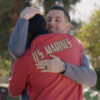The last time I spoke with Michael Cuesta, it was the morning after the Tribeca Film Festival premiere of his last film “Tell Tale” was interrupted by an elderly gentleman who fainted, which when added to the fact that the update of the gothic Edgar Allen Poe short story began filming at a Baltimore train station the week after someone died there in an accident, would seem to suggest that the production was cursed. As Cuesta explains now, that wasn’t entirely inaccurate, but not in a spooky, supernatural sense unless one (understandably) considers the enigmatic ways of bigger-budget indie productions to be scary and elusive.
So it was definitely a triumph when Cuesta returned to the festival last spring with “Roadie,” a refreshingly bittersweet film that follows Jimmy, a 25-year veteran guitar tech (Ron Eldard) for the Blue Öyster Cult who realizes he has more to fear than the reaper after he’s let go by the band. At an age when he might be deemed a golden oldie himself, his ‘70s-style flowing, flaxen mane not helping matters, Jimmy comes home to Queens to a doting mother (Lois Smith) whose memory is fading and the married Randy (Bobby Cannavale) and Nikki (Jill Hennessy) from high school who represent the suburban life he’d like to forget.
Since there’s no tinge of irony when Cuesta or his brother Gerald, who wrote the script, refer to the Cult as the B.O.C. in casual conversation, it’s clear they don’t believe Jimmy is a fool for following his dream of living out the rock ‘n’ roll lifestyle, though his blind devotion to the band that has left him out of touch with anything besides it can be painfully hilarious when it isn’t painfully desperate. While much of the credit for the film’s emotional rawness belongs to the tremendous performances of its cast, which in turn owes much to its director’s unforced style, it also surely benefits from the perspective of both Cuesta brothers who avoided a fate similar to Jimmy’s after first propelling themselves into the spotlight with the searing Brian Cox-Paul Dano drama “L.I.E.” back in 2001.
Both recently took the time to talk about their homecoming to the outer boroughs, what went wrong with “Tell Tale,” what would go right with “Roadie” and the rock magazine clippings that lined their walls as teenagers.
Besides the pilot for the potential 2007 CBS sci-fi series "Babylon Fields," this is the first time you've been credited with working together since "L.I.E." How do you decide when you’re going to collaborate on something?
Michael Cuesta: I just like working with Gerald. He knows me, he could finish my sentences and vice versa and that’s really it.
Gerald Cuesta: I love working with Michael because when we’re throwing ideas around, sometimes I could come up with a broad idea and he can really sharpen the pencil in a way. We compliment each other that way.
How did this one get started?
GC: I wrote a screenplay about six years ago, which was broader –it was basically about a schleppy roadie in his forties for a hair metal band that gets fired, doesn’t have any place to go, has no connections and he goes back home to Queens and he tried to put together his own band. It was written in a more comical [way], sometimes with Tarantino touches to it. I sent it to Michael and I don’t think he liked it. [laughs] Then about three years later, he called me and he goes, “I read this again and I really, really like the idea of this character and I like the first 20 pages when he comes home to see his mother. I would like to take everything else away.”
Michael, was there something that inspired the change of heart?
MC: Yeah, I had just gotten off of my third film, a project that was kind of a smaller, studio-like movie with Ridley Scott as my producer and I got beat up pretty bad. I didn’t write the film — actually, Gerald and I worked on doing a pass, but we weren’t credited — and it was [during] the writers’ strike. We never got the script right and I made the movie and it didn’t turn out well. I had huge fights with Ridley Scott in the editing room and his production company.
I was just really discouraged and feeling like maybe I’ll never be able to do this again. I decided the only way is if I make something from the heart, something that’s personal, something that’s small that I can creatively control. And I went in the drawer and found this “Roadie” script that Gerald had written that was quite different from what we ultimately did. I saw something in this character that I was relating to and I thought it would be a much more interesting story to tell the first day of the rest of his life, so to speak, rather than this long six-month period of a roadie trying to put his band together. The themes about Jimmy, about aging, about coming to terms with maybe your dreams not working out, all those themes were the things that we dug in deep. We felt it was better told if this guy was just coming home, still hanging onto that dream and ultimately being truthful to himself and the person who’s most important to him, who is his mother.
Was it different to tell a story limited to the course of a day?
MC: The script flowed really well because it’s one day and it’s a lot easier to have less days for production and to tell the story than more. That doesn’t mean it’s going to be a good story, but not considering this first draft, which was more traditional, I talked about originally doing the film in real time, his first 90 minutes home. I was going to do it in one take, too. I had all these different ideas and obviously, that didn’t work out, but I just found it easy to do. I only shot for 17 days.
GC: One of the things the film does really well is leading into a day that gets away from you, where it’s taking a rush into a wrong turn some place. I have and I know other people have had those days, those long days where maybe you get a little too fucked up…like this is not how you started your day, this is not what you wanted to happen, this is not what you wanted to say. But the events of the day lead you one step further, one step further into it and then all of a sudden, you can’t take it back.
Given your first collaboration “L.I.E.” dealt with children having to grow up too fast, was it an interesting contrast to make a film about a grown-up struggling with arrested development?
MC: It’s when you make them. At the time you’re doing it, if you’re pulling from yourself, you’re going to pull from where you’re at in your life at the time. When I did “L.I.E.,” I was very much looking at my past because the film is semi-autobiographical and it was us growing up in Long Island. That was really the relation to it. That was the place I knew. The film was very much about someone trying to connect, a teenage drift and looking for where he fits into the world and finds it in a very disturbing, yet almost oddly comforting place, but at that time, that’s what was important to me.
Then you get into your forties – we’re in our forties – and this story was important to us. It is sort of a midlife coming-of-age movie. I don’t have any desire to go back another teenage growing up movie in Long Island. “Roadie” is very semiautobiographical as well. Jimmy is very much an everyman, but he’s Gerald and I. And the mother’s very much our mother in a lot of ways and then we grew up with a Randy and there’s the girl that got away.
Did either of your rooms growing up look like Jimmy’s [which appears frozen in time with stacked stereo equipment and pictures of rock stars plastered on the walls]?
GC: Both of our rooms did.
MC: Yeah, both of our rooms. I probably copied Gerald because he’s a couple years older than me, so he had all the albums [and] all these Circus and Rolling Stone articles before me. So I followed suit. I was cutting out all the Circus magazine [articles about] Aerosmith and Zeppelin and B.O.C. – all the bands that were hot in the late ‘70s.
GC: Yeah, yeah, yeah. I remember you had posters in your bedroom, I had posters in my bedroom.
MC: But the funniest was the cutouts from the magazines where you would just cut them out with scissors and then tape them up. My mother hated it because it wasn’t good for the wallpaper.
GC: That’s one of my favorite little touches [in the film] – it’s just a little thing, but…
MC: Oh, the hole in the magazine?
GC: The hole in the magazine. When we saw the screening at Tribeca, it was gratifying to hear other people who hadn’t seen the movie before get it and laugh when they saw that.
MC: I think there’s a whole group of people out there that have gone through their rock magazines and cut out pictures.
Were some of the Circus and Creem magazines used in the film actually ones you had kept around?
MC: Unfortunately, no. I wish I still had some, but our production designer John El Manahi’s a rock dude. He’s our age and he’d been in bands and he had a really great vinyl collection, which I [also] do not have anymore unfortunately. But what’s in the movie is his collection — the B.O.C. and the Robin Trower. The Good Rats we had to find.
Even in Long Island?
MC: Yeah. Someone was asking earlier if they thought the film was set in a different time, it wasn’t clear to them if it was contemporary. And that’s fine. To me, it was today, but there’s nothing in the movie that tells you it’s today other than a car that drives by because the movie is about being stuck.
“Roadie” is currently available on VOD, Amazon Instant, iTunes, VUDU, Xbox and PlayStation and opens theatrically on January 6th at the Cinema Village in New York.



